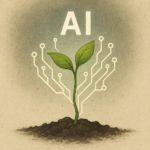AI for Materials Science
Increased use of AI to discover and design new materials is expected to open up new prospects in clean energy and medicine. Today, AI is already being used to control robots specialized in testing multiple material samples. They are capable of performing hundreds of automated tests and thus generating new materials not yet discovered. The idea here is to let the machine develop and test new, unprecedented combinations of materials in record time. Typically, the development of a single sample by a human operator can take up to three weeks.
AI in Mathematics
Increasingly, researchers are focusing on the question of AI and mathematics. Training using reinforcement learning models has allowed some models specifically trained for mathematics to solve relatively complex problems, such as decrypting Faro varieties (abstract elementary forms of geometry) or solving problems in knot theory.
AI in Advanced Robotics
Robots will become more autonomous and adaptable, capable of learning and adapting to new tasks and environments. AI will help robots to adapt to their environment, replacing the traditional sensors and detectors of all kind still needed today to help the robot determine correctly where it is located in the space. AI will be needed to help the robot to adapt its force towards the objects it is manipulating.
AI and Agriculture
AI can bring a whole new dimension to this field as well. Combining detailed weather forecasts with knowledge of soils, plants, and animals, it can provide excellent advice to farmers who will face increasingly significant challenges: increasing yield while reducing, or at least not increasing, workload; effectively combating diseases; or dealing with increasingly strict environmental policies. AI-powered tools are already being developed and field-tested, with the aim of helping farmers get the best return from their harvest.
AI for Sustainability
More sophisticated AI applications to combat climate change, optimize resource use, and promote a circular economy are expected to emerge. This may seem paradoxical, since AI is one of the drivers of data center growth and their increasing electricity consumption. But AI can nevertheless help us and provide insights to find technologies capable of doing more with less. Or assist in improving electrical distribution networks, by increasing efficiency here and there.
AI in Healthcare
Advances in genomic data analysis, accelerated drug discovery, and treatment personalization will enable more targeted and effective therapies.
In the healthcare domain, these AI-driven advancements will allow for more accurate and personalized diagnostics, as well as more integrated patient care systems.
Industrial Integration
The adoption of AI in industrial sectors will continue to expand, with applications in manufacturing, logistics, and smart agriculture, making these sectors more automated and efficient.
Vehicle Autonomy
Autonomous vehicle technology is expected to progress, with improvements in safety and wider adoption, particularly in urban areas.
